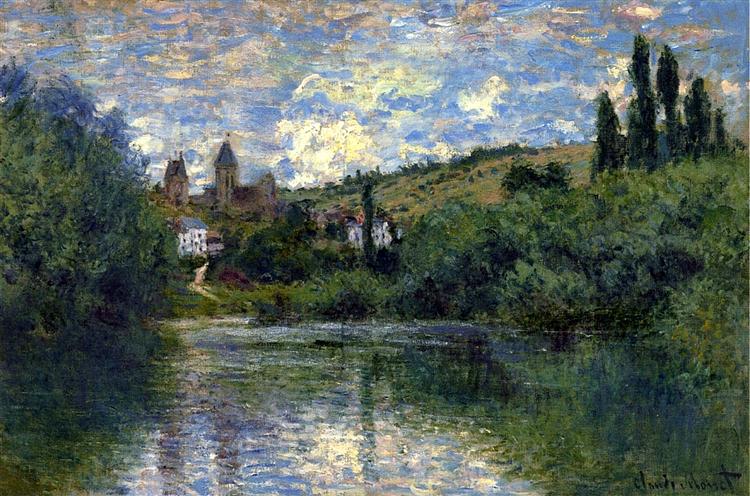Kuvaus
Claude Monetin maalaus "Vétheuil - 1880" on upea esitys ranskalaisesta maisemasta, kiehtova esimerkki esteettistä ja teknisistä huolenaiheista, jotka hallitsivat työtä mestari impressionistinen. Monet, jolla oli aina erityinen yhteys valoon ja luontoon, vangitsee tässä työssä paitsi paikan olemuksen, myös sen mielialan ja ilmapiirin.
"Vétheuil" -tapahtumassa tarkkailemme hiljaista maisemaa, joka aukeaa katsojaa, jossa Seine -joki kulkee sujuvasti koostumuksen keskustan läpi, puiden ja kasvillisuuden kehystetyt, jotka näyttävät tanssivan Breezen kompassiin. Tämän erityisen paikan valinta, pieni yhteisö Seine-Eise-alueella, vastaa Monetin kiinnostukseen maaseudun elämään ja luonnonmaisemiin koko uransa ajan. Maalauksen läpi kulkeva joki toimii yhdistävänä elementtinä, kutsuen silmän matkustamaan maalin ja löytämään elämän, joka aukeaa joka nurkassa.
Koostumus on runsaasti vastakohtia, jotka korostavat puiden varjojen ja veden valoisuuden välillä. Monet käyttää palettia, joka värähtelee syvän sinisen ja elinvoimaisen vihreän välillä, joka on varustettu valkoisen ja keltaisen kosketusten kanssa, jotka viittaavat auringonvaloon heijastavan veden pintaa. Tämä kyky vangita valo ja sen vuorovaikutus veden kanssa on ominaista impressionismille, liike, jossa Monet oli perustavanlaatuinen rooli. Sen löysä ja nopea siveltimen tekniikka antaa maalauksen hengittää ja vangita lyhytaikaisen olemuksen, huolellisen havaintoharjoituksen, jolla pyritään kääntämään ympäristön havainnollisen kokemuksen.
Vaikka työssä ei ole laajalti näkyviä ihmishahmoja, pienen veneen läsnäolo vedessä viittaa toimintaan ja elämän tunnetta tapahtumapaikalla, mikä tarjoaa tasapainon maiseman luonnollisen ja ihmisen puuttumisen välillä. Tämä hienovarainen osallisuus tarjoaa teokselle implisiittisen kertomuksen, jonka avulla katsoja voi kuvitella joen ympärillä asuvien päivittäistä elämää.
Monet käyttää älykkäänä näkökulmaa, jossa maiseman eri kerrokset ovat luonnollisesti päällekkäisiä. Etualalla olevat puut tarjoavat tekstuurisen vaurauden, joka on ristiriidassa taivaan ja veden pehmeyden kanssa. Taivaan vivahteet, jotka vaihtelevat sinisen ja harmaan välillä, herättävät muutoksen ilmapiirin, ehkä viittaavat myrskyn saapumiseen tai yksinkertaisesti ajan kulumiseen hiljaa talvipäivänä.
Tämä työ ei ole vain maiseman kuvallinen esitys, vaan myös ihmisen tunteiden tutkiminen luontoon. Teos on laajemmassa yhteydessä impressionistisessa liikkeessä, jossa taiteilijat, kuten Pierre-Auguste Renoir ja Camille Pissarro, käsittelivät myös valoa, väriä ja ulkoista elämää, vaikkakin jokaisella on oma lähestymistapa. "Vétheuil" -kohdassa Monet on sijoitettu a mestari Etsiessään tätä henkistä yhteyttä luonnolliseen ympäristöön jättäen perintön, joka edelleen vaikuttaisi taiteilijoiden myöhempiin sukupolviin.
Yhteenvetona voidaan todeta, että "Vétheuil - 1880" on todistus Claude Monetin ainutlaatuisesta kyvystä, taiteilija, joka ei vain heijasta luonnon kauneutta, vaan myös vangitsi hetken ja paikan tunne, kääntäen maalauksen mediaksi medialle kommunikoida hänen läheiseen suhteeseensa häntä ympäröivään luonteeseen. Tässä työssä on olemassa impressionismin mikrokosmos, jossa valo, väri ja koostumus on kietoutunut tarjoamaan visuaalista kokemusta, joka ylittää yksinkertaisen näkemisen, kutsuen katsojan tuntemaan.
KUADROS ©, kuuluisa maali seinällesi.
Käsivalmistetut öljymaalaukset, ammattitaiteilijoiden laadun ja erottuvan sinetin kanssa KUADROS ©.
Kuvien jäljennöspalvelu tyytyväisyystakuu. Jos et ole täysin tyytyväinen maalauksen jäljennökseen, palautamme rahasi 100%.

